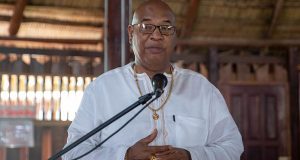LONDON, England, June 28, (CMC) – The London-based Privy Council, today, dismissed an application by policy holders of the financially troubled Colonial Life Insurance Company (CLICO) saying that an assurance given by the Trinidad and Tobago government had created a “legitimate expectation” enforceable in law.
The United Policy Holders had argued that the Kamla Persad Bissessar-led People’s Partnership government had, following the May 2010 general election, “failed to honour that expectation, and that they are entitled to relief accordingly.
The policy holders had been successful in the High Court, but failed in the Court of Appeal. The appellants all held versions of a CLICO policy called the Executive Flexible Premium Annuity (EFPA). These policies were distinguished by the offer of relatively high interest rates paid out on the premium for a fixed initial period. They also included provision for an annuity on the life of the policyholder, and were thus within the definition of “long term insurance business” for the purposes of the Insurance Act.
The Privy Council, the island’s highest court, also noted that the claim arose out of the banking crisis in early 2009 when CLICO was in serious financial difficulties.
But in a 37-page ruling, the Privy Council said that it was “unimpressed with the appellants’ contention that it would have been cheaper for the government to abide by the assurances to pay out the policyholders protected by the Fund, as opposed to paying all policyholders, which is what it proposed.
“Ignoring the fact that this is an oversimplification of the government’s 2010/2011 policy when put forward in 2010, and when crystallised in 2011, it overlooks the fact that those proposals involve payments being made over a much longer period than would have been involved if the assurances had been complied with.
“In any event…a very significant reason for abandoning the assurances and adopting the 2010/2011 policy was to ensure IMF (International Monetary Fund) approval and the confidence of the international financial community, and that is by no means necessarily consistent with opting for the cheapest scheme,” the five Law Lords ruled.
They noted that the appellants had argued that when deciding to abandon the assurances and to adopt the 2010/2011 policy, the government did not take into account the fact that the assurances had created a legitimate expectation with all that that entailed.
“It is true that in the course of 2010 after the election, both the Prime Minister and (Finance Minister Winston) Dookeran denied that there had been “guarantees” to any policyholders, and on one occasion Mr. Dookeran referred to the assurances as “empty, hollow statement (s)”.
The Privy Council said that a judge has to be rather careful of treating a statement made in a political context as if it was intended to have the meaning which it would have if it had been given under oath in court or in a legal document.
“Furthermore, it is technically right to say that, even if they gave rise to a legitimate expectation, the assurances would have fallen short of being what a lawyer, or even someone engaged in commerce, would regard as a ‘guarantee’.”
The Law Lords also said that the notion that insufficient attention was given to the assurances as a factor against adopting the 2010/2011 policy has a little more attraction.
They said, if they are assuming “there was a legitimate expectation in the light of the assurances, there is obvious force in the point that the government should have considered, very seriously, the fact that it would be reneging on the assurances before embarking on the 2010/2011 policy.
“The history…does give rise to a concern whether the implications of departing from the assurances were given proper weight. In the end, however, the Board is satisfied that they were.”
The Privy Council said the fact that the assurances were swept aside in public does not mean that they were not given proper consideration by the government when making decisions.
“The evidence from the government, and in particular from Mr. Dookeran, supports the contention that they were. He stated that the government “gave careful consideration to the expectations engendered by those statements …and the negative effect that might be suffered by those who had relied on those statements”.
“Of course, courts should not always take what is said in an affidavit or witness statement as accurate, simply because it is sworn to be true. However, where the deponent is the Finance Minister, and there is no convincing evidence to contradict what he has said, then it seems to the Board that a tribunal, in this case, the Court of Appeal, is entitled to accept what he says as being accurate.”
The Law Lords also noted that in any event, the proper weight to be given to a promise giving rise to a legitimate expectation before departing from it, must depend on all the circumstances of the particular case.
“In this case, the assurances had macro-economic (and therefore macro-political) implications, and, it is clear from the evidence, that the committee which came up with the three options and recommendation… gave careful consideration to the implications of all possible courses, and it is also clear that the time pressures were considerable.
“In those circumstances, on the totality of the evidence, the Court of Appeal was certainly entitled to reach the conclusion that appropriate attention was given by the government to the existence and effect of the assurances before they were abandoned,” the Privy Council ruled.
In June 2010, the government appointed an expert select committee to provide recommendations on the way forward for CLICO and the Group. Its mandate required it to make recommendations on “a preferred solution, from a menu of options, for the repayment of CLICO’s traditional and non-traditional (EFPA) insurance liability products”, a financial reorganisation plan for CLF, and a “clear path and timetable” for the government to “exit its loan capital position and restore public confidence”.
At the end of July the committee reported on three options. Provide no further funding and liquidate CLICO and BA; fully fund the entire asset shortfall of CLICO and BA and repay all creditors based on contractual terms (not just policyholders protected by the statutory fund) and provide TT$75, 000 (One TT dollar =US$0.16 cents) to all EFPA and Mutual Fund policyholders (including non-residents not protected by the fund); and pay remaining liabilities by government bonds spread over a 20-year period. On August 12 the Cabinet considered the report and the third option.
The appellants also argued that the 2010/2011 policy was unlawful in that it required the Fund to pay out moneys at a time when it was in deficit, contrary to section 37 of the Act, and also it required the trustees of the Fund to pay out moneys without exercising their own discretion as to whether it should be paid out.
But the Privy Council ruled that the first point “overstates the effect of section 37, although it is a fair point that failure to make up a deficit in the Fund represents a breach of duty.
“But such a breach has long existed and would exist on any view. Further, especially in the light of that fact, any breach of section 37 could not invalidate the 2010/2011 policy.”
It said regarding the second point, “a problem could possibly arise if the trustees refused to pay out in accordance with the 2010/2011 policy (assuming they would be entitled to do so), but it is hard to see how that possibility could render the policy unlawful.
“At worst, it represents a risk for the implementation of the policy, but, particularly as there has been no suggestion of the trustees taking such a course, it would appear to be a risk which the government could reasonably consider was one which was worth taking.”
The Law Lords said that another problem with the policy, according to the appellants, is that it was unlawful in discriminating between resident EFPA policyholders, who were to be paid 75 per cent at least according to the appellants’ evidence, although the government say the figure is 92 per cent, and traditional policyholders, who were to be paid in full.
“There is a difference between these two classes of policyholders, and therefore the Board has some doubt as to whether the discrimination argument is well based in any event.”
The Privy Council also noted that the appellants relied on the fact that, as they saw it, the government had “wholly unreasonably refused to supply them with information since September 2011.
“It is unnecessary at any rate at this stage to decide whether the factual basis for this contention is correct Even if that were true, the Board cannot see how it assists the appellants in contending that the decision to abandon the Assurances was unjustified in law.
“At best, it might go to costs. In any event, once these proceedings had been started, the appellants could have asked the court to order disclosure of any documents which the court considered that they should see.”
 Pride News Canada's Leader In African Canadian & Caribbean News, Views & Lifestyle
Pride News Canada's Leader In African Canadian & Caribbean News, Views & Lifestyle




